Political reporter
The public no longer backs spending on international aid, Trade Minister Douglas Alexander has suggested.
The former international development secretary under Gordon Brown told BBC Radio 4’s Political Thinking with Nick Robinson that even if money was not tight, “the argument would have to be made” for investment in foreign aid.
Prime Minister Sir Keir Starmer announced a cut in the international aid budget to fund an increase in defence spending earlier this year.
The move was strongly criticised by charities, which argued that it would be devastating for vulnerable people worldwide, as well as undermining the UK’s interests.
Alexander said he had long believed it was “morally right” and “strategically smart” to invest in international aid but added: “I think we have lost the argument at various points.”
“We have an interest in building a stable, more equal, more safe world for our future generations,” he said.
“But public consent has been withdrawn. And truthfully on aid, it’s not just fiscally challenged, it’s culturally challenged as well.
“Even if the money weren’t tight, the argument would have to be made.”
He added that there had been reversals in a number of countries which had previously been leaders in international development funding, ranging from the United States to France, Germany and Norway.
During the interview, Alexander recalled attending the Make Poverty History march in Edinburgh, which took place 20 years ago.
The march saw thousands of protesters call for the cancellation of debts owed by poorer countries and more aid for Africa.
The campaign ahead of the G8 summit of the world’s developed nations in Gleneagles also included a series of Live 8 concerts around the world.
“I carried my son on my shoulders, I pushed my daughter in the pram, there were a quarter of a million people arguing that we should make poverty history internationally,” he said.
He added that the campaign showed “politics and the choices we make matter”.
 Getty Images
Getty ImagesAlexander served as international development secretary between 2007 and 2010, after previously holding a number of ministerial roles under Sir Tony Blair.
Both Sir Tony and Brown committed to increasing the overseas aid budget to 0.7% of national income, despite growing financial pressures.
The target was reached in 2013 under David Cameron’s Conservative-Liberal Democrat coalition government, before being enshrined in law in 2015.
However, aid spending was cut to 0.5% of national income in 2021 under the Conservatives, who argued the move was needed to keep public debt down during the Covid pandemic.
Earlier this year, Sir Keir said that figure would fall further to 0.3% in 2027 to fund an increase in defence spending.
A survey by YouGov in February suggested 65% supported this move.
However, Romilly Greenhill, chief executive of Bond, the UK network for NGOs, said public support for maintaining UK aid remained similar to levels during the 2010s, pointing to research by the Development Engagement Lab project.
“The UK public knows that UK aid is not only the right thing to do, but it is essential for our national security,” she said.
“It helps prevent future pandemics, tackles the root causes of poverty, conflict and climate change, and contributes to making both the UK and the world a safer, healthier and more prosperous place for us all.”
She urged Alexander to “show leadership and play a key role in remaking the case to the British public”.
Alexander returned to Parliament last July as the MP for Lothian East and was made trade secretary, after previously losing his seat in a shock defeat in 2015.
It is understood the government’s new trade strategy will be published next Thursday.
Alexander said the strategy would recognise “that we’re an 81% services-based economy” and the second largest exporter worldwide of services, which covers things like the financial and IT sectors.
He added that it would set out “how we take down barriers [to trade]… to the benefit of every region of the UK”.
Alexander also said the UK needed to work on its “biggest trading relationship” with the European Union, after striking a deal last month covering areas including fishing, food exports, defence and energy.
He said the agreement was “the start of a process” and the government wanted to see further progress in areas such as mutual recognition of professional qualifications.
You can listen to the full interview on BBC Radio 4 on Saturday at 17:30 BST or on BBC Sounds.




